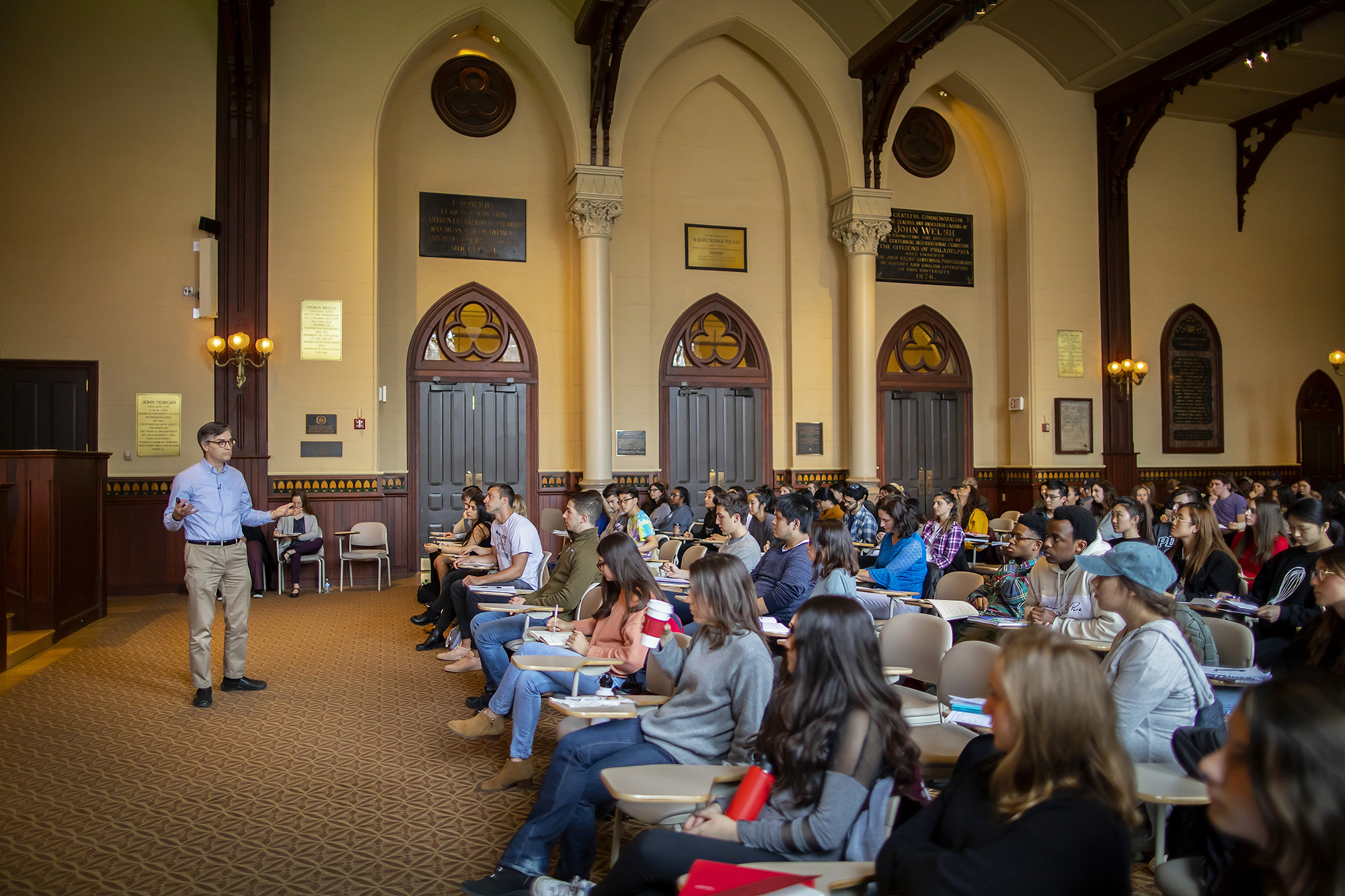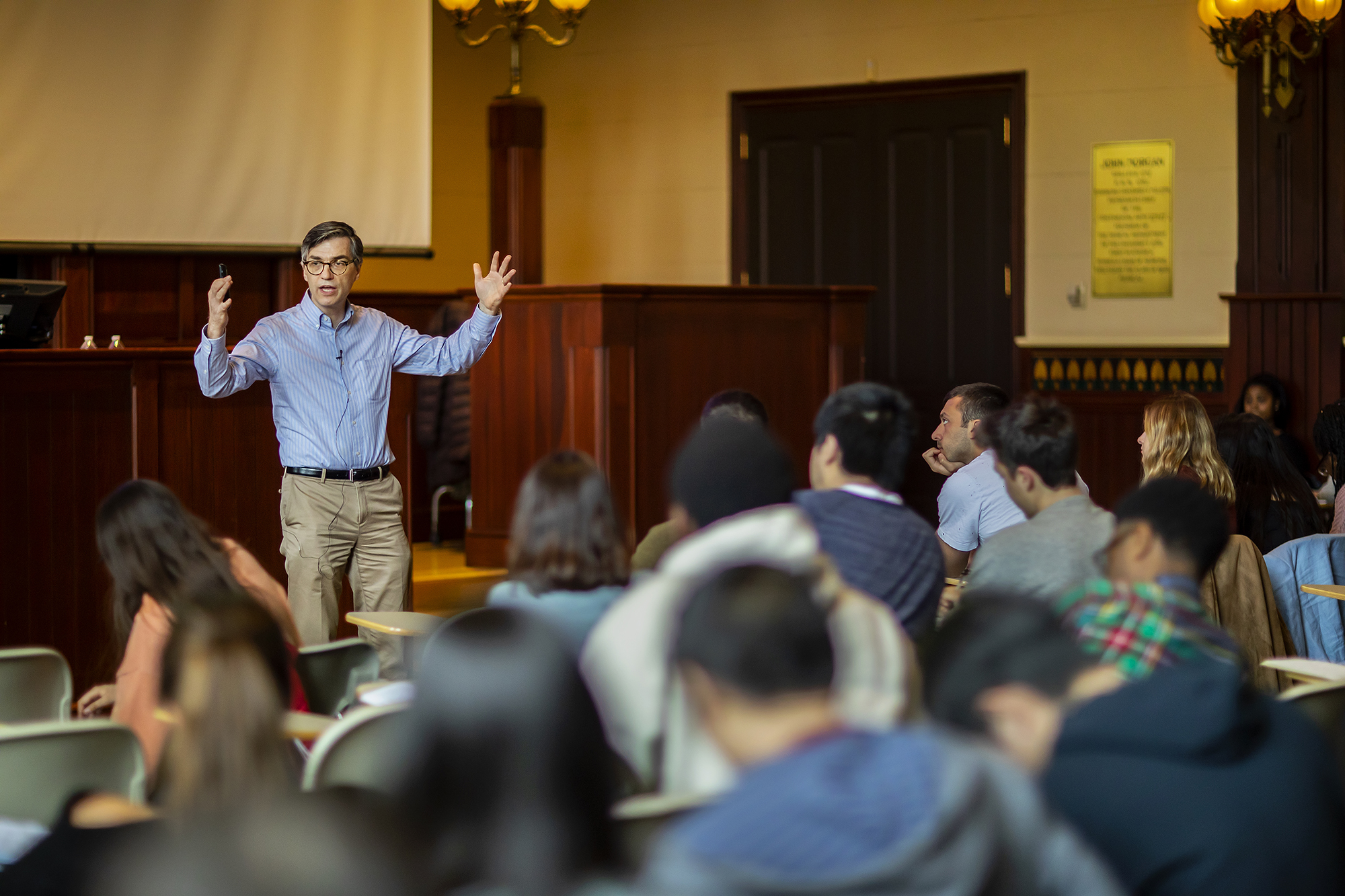
In a large College Hall room that’s part auditorium, part classroom, Penn professor James Pawelski discusses his college experience.
“I was not a positive, upbeat person back then,” he says. Knowing this about his personality, he developed a test: To help determine whether a thought was helpful or harmful, accurate or inaccurate, he asked himself whether he’d been eating, sleeping, and exercising properly. “If the answer was ‘no,’ then I didn’t trust that thought,” he explains.
Pawelski wasn’t detailing this personal story to friends or colleagues but rather to more than 150 undergraduates in his course The Pursuit of Happiness (POH), offered for the first time this semester. The class, open to every year and major, aims to use psychology and philosophy to help students explore what happiness is and how to successfully pursue it. But it’s about more than gaining a cursory intellectual understanding of the subject; Pawelski wants the undergrads to practice what they’re learning and form long-term habits. And he and 10 teaching assistants are learning along with them.
“One way of teaching a class like this would be to say ‘science says A, B, C, D; do it, see what happens.’ But to me, that’s not a democratic approach,” says Pawelski, a professor of practice in Penn’s Positive Psychology Center, where he runs the Master of Applied Positive Psychology (MAPP) program. “I’m hoping students will not only take away scientific advice but realize that the pursuit of happiness is their responsibility, their inalienable right. It’s up to them to figure out how to pursue it. It ought to be a core thing we think about because it’s a life-long kind of engagement.”
The class itself has been on Pawelski’s mind in some shape or another for 20 years. To accomplish what he envisioned, he felt there should be some sort of lab component, the idea being that, in the same way learning chemistry from a book differs vastly from actually mixing chemicals, so, too, does learning the principles of happiness differ from actions like meditating or exercising.
So one assignment asks students to exercise vigorously for 75 minutes each week on any three days and with any type of exercise. They’re also required to meditate for 10 minutes a day, six days a week, and to log each activity, keeping notes about how they feel during and after. They get together weekly for recitation-style POH team meetings, and their final project is what Pawelski calls a “Happiness Manifesto,” which integrates what they’ve learned during the semester with their own definition of happiness.
“My job isn’t to foist habits on students, and I’m not teaching this class because I’m the model of happiness that I hope the students will follow,” he says. “Really the pursuit of happiness is not a class but part of their lives. Regardless of how well they do academically, much more important for them will be what they take away for their own life moving forward.”
More than halfway through the semester, junior Ton Nguyen has already gained more than she expected to from a college class. Nguyen, from Atlanta, took the course to better understand why, in her opinion, advancements in human happiness haven’t kept pace with fields like technology and health care. She also wanted some perspective on how views of happiness may vary as a result of cultural or socioeconomic differences.
“From my experience, happiness in some cultures has an emphasis on collective viewpoints. My happiness is dependent on my family or community. It’s a big privilege or can even sometimes feel selfish to explicitly pursue happiness,” Nguyen explains. “We find it to be not a struggle but something we think about when we’re pursuing happiness, and when our happiness is so dependent on making others around us happy.”
The subject isn’t easy to discuss openly, but Nguyen says the course is structured to encourage thought-provoking conversations. “Professor Pawelski and the teaching assistants tell us that the class is a learning experience for them as well,” she says. “I appreciate how the very nature of the class is so unique. There’s a culture of care established, and that’s what so special about it.”
Pawelski and the TAs, who all graduated from the MAPP program, have worked to foster such a culture. The POH team meetings, overseen by Laura Taylor, managing coordinator of education in the Positive Psychology Center, invite students to speak freely yet also push them beyond their comfort zones. “We do our best to create a sense of community that allows them to feel supported,” Taylor says.
“Positive psychology in general is not a prescriptive field. It’s descriptive,” she adds. “We’re not prescribing a particular pathway for a student. I’m not going to tell you what to value or how to prioritize. Creating real change requires your own effort and engagement. You pick up the tools that work for you.”
It’s a mantra that sophomore Madison Jaffe has taken to in her own quest. Jaffe has been interested in positive psychology since high school and jumped on the chance to take the new course. In the future, she hopes to study happiness and help others find it, so she felt it was important to work on this aspect of herself, too. POH has helped her become more open, meet new friends, and even start meditating regularly.
“I’ve been wanting to meditate for years, so I think it’s a great assignment,” says Jaffe, from Ventura, California. “It’s helped me to be more objective in thinking about tasks I have to do. I’m not perfect with it, but it does calm me down, and it’s been a practice that I’ve adopted into my life more regularly.”
That’s the point, if you ask Pawelski, who plans to teach the course again next spring. “I’m not like a mechanic tuning people up,” he says. “My job is to present options, informed by science and by the humanities, and encourage the students to be self-aware about what choices they’re making.”
He also sees this class as part of the broader commitment to wellness across campus, with strong support from Provost Wendell Pritchett and Chief Wellness Officer Benoit Dubé. To that end, Dubé and University Chaplain Charles Howard came to speak to the class, two of numerous guests from various backgrounds who talked openly about their experiences.
Back in that College Hall room, Pawelski tells a story about encouraging his son to stick with an after-school chess class. The ensuing argument led to a new rule in their home: In an attempt to lighten any mood, complaints going forward were only allowed if spoken using a British accent. He then reminds the students that in fact, the whole course is really an experiment, a “happiness lab” intended to not only change knowledge but also behaviors, and he reiterates the need to practice the skills and habits of happiness.
Though the undergrads may view these tasks as assignments right now, Pawelski and his team hope they’re providing the tools—and the motivation—to lead to long-term change.
James Pawelski is a professor of practice and director of education in the Positive Psychology Center and an adjunct professor of religious studies in the School of Arts and Sciences at the University of Pennsylvania.
Laura Taylor is the managing coordinator of education in the Positive Psychology Center at the University of Pennsylvania.
Ton Nguyen, a junior from Atlanta, is a philosophy politics and economics major with a minor in consumer psychology in the School of Arts and Sciences at the University of Pennsylvania.
Madison Jaffe, a sophomore from Ventura, California, is a communication major in the Annenberg School for Communication minoring in consumer psychology in the School of Arts and Sciences at the University of Pennsylvania.








